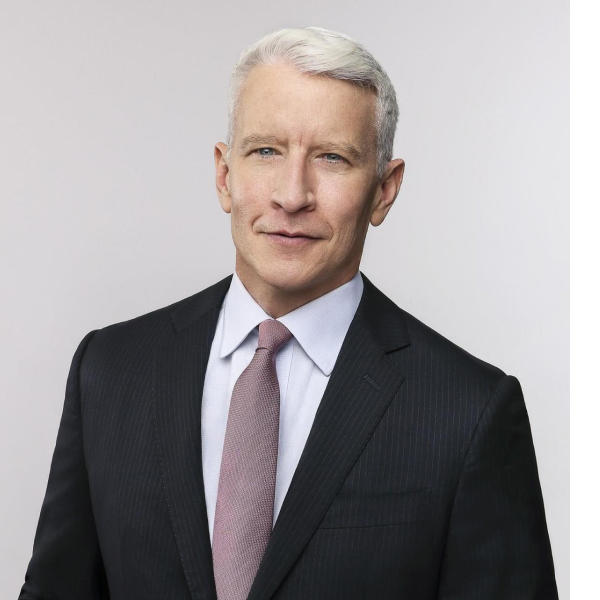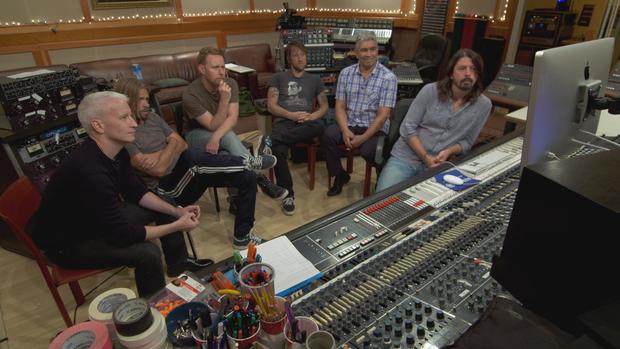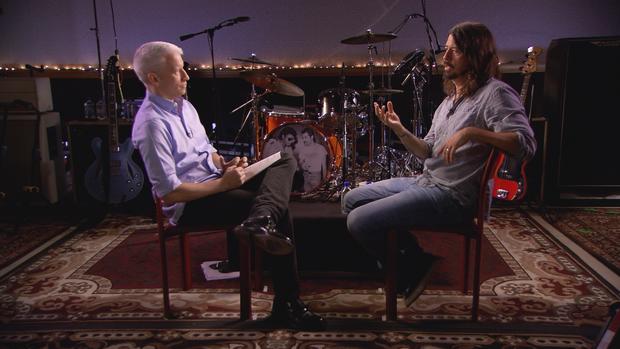Foo Fighters
The following is a script of "Foo Fighters" which aired on October 26, 2014, and was rebroadcast on June 28, 2015. Anderson Cooper is the correspondent. Keith Sharman, producer.
When David Letterman retired in May he could have chosen just about anyone in the world to be his final musical guest. The honor went to Foo Fighters, one of the last great American rock bands that consistently sells millions of albums and fills stadiums around the world. They were created 20 years ago by lead singer and guitarist Dave Grohl, but it was his latest project that really got our attention. The band has made a multipart documentary and recorded an album called "Sonic Highways." It's a mix of music history, journalism, songwriting and old-fashioned rock and roll, and as we first reported last fall, it's unlike anything any rock band has ever attempted, and a reflection of everything Dave Grohl loves about making music.
Foo Fighters' sound is raw, real rock 'n' roll. No tricks. No gimmicks.
This was one of two sold out shows they played to 165,000 fans in London's Wembley Stadium in 2008, but Dave Grohl insists money has never been his motivation.
Dave Grohl: The reward of playing music should be playing music.
Anderson Cooper: But isn't that easy to say for someone who's, you know, incredibly successful?
Dave Grohl: It's really easy to say. But that's the way I felt before any of this happened. I I wasn't doing it so that this would happen. I was doing it because I loved it.
Anderson Cooper: And you still love to play?
Dave Grohl: Oh, dude, yeah, a lot.
That love of playing is what Grohl believes should always be at the heart of music.
"People need to appreciate their voice. I don't want to sing like someone else. I want to sing like me."
Dave Grohl: Don't worry about what everyone else thinks. Don't let someone say, like, "Sorry. You didn't win the song contest. Go home."
Anderson Cooper: But on "American Idol," the judges will say, "Well, look, are you doing somebody a favor by telling them, 'Keep going' at something they're not good at?"
Dave Grohl: Who's to say who's good or not? Imagine Bob Dylan standing there and singing "Blowin' in the Wind" in front of those judges. "Sorry, it's a little nasally and a little flat. Next."
Anderson Cooper: How would you do in "American Idol"?
Dave Grohl: Oh, I would never make it, ever, in a heartbeat. People need to appreciate their voice. I don't want to sing like someone else. I want to sing like me.
Grohl was singing his heart out when we met up with Foo Fighters last year in New Orleans. They'd taken over Preservation Hall, a legendary jazz performance space in the French Quarter. On a Saturday night the windows were opened up for the first time in more than 50 years so the band could play a surprise show for hundreds of stunned passersby.
The concert was being shot for an eight-part HBO documentary about the history of modern American music that Dave Grohl is directing. Each episode focuses on the unique musical heritage of one city. To help him learn that history Grohl interviewed local musicians everywhere the band went, among them Troy Andrews, better known as "Trombone Shorty."
[Dave Grohl: Where you from?]
[Trombone Shorty: From New Orleans, from here, Tremé neighborhood]
Dave Grohl: When I interview these people I get them to explain not only the history of the city but the influence that that has on the music that comes from here. There's a reason why Chicago blues sounds like Chicago blues. And there's a reason why jazz music is here, in New Orleans.
Anderson Cooper: And the reason is the history of how that music was formed.
"It's just such a big soup, American music, you know, it's all connected. It's not like what we do is drastically different from what a country band would do."
Dave Grohl: It could be anything. In Seattle, it rains all the time, so people stay in their basements and write songs.
Grohl approached the project as a both a musician and a historian, and says he was often surprised about what he learned.
Dave Grohl: Well everybody knows Nashville as the country music capital of the world. But then I start to realize, wait a minute, all of the foundation of a lot of these musicians is in the church. Whether it's Dolly Parton or Carrie Underwood, like they started in the church. I never knew that.
Anderson Cooper: It seems like the subtext is the roots of music matter...
Dave Grohl: Oh, yeah.
Anderson Cooper: ...and are important for people to know.
Dave Grohl: I feel like I have the opportunity and the resource to give this to everyone. I can do it. So why wouldn't I do it?
What made the project so ambitious is that Grohl wasn't just shooting a documentary, he was also using the interviews to come up with material for a new song he'd write in each of the eight cities Foo Fighters spent a week in.
Anderson Cooper: The way you're writing songs for this album is completely different than...
Dave Grohl: Yeah.
Anderson Cooper: ...anything you've ever done. And, as far as I know, different than anyone's ever really done.
Dave Grohl: These are all things that people have talked about. New Orleans is a crossroad, the spirits on the square. Cyril Neville used to watch his family play music through like cracks on the door. He'd press his face against the screen. He'd go home with the imprint of the screen on his head.
Anderson Cooper: So these are all phrase you got out of interviewing various artists.
Dave Grohl: Yeah, words and phrases.
Grohl had just written the song an hour earlier. It won't be released until next month, but he invited us to watch him record it.
It's called "In the Clear" and references the lingering effects of Hurricane Katrina and the history of jazz.
None of the Foo Fighters knew much about jazz before coming to New Orleans, but that was the whole reason to make the trip.
On their last day in town, Grohl and the band joined a large crowd on St. Charles Avenue to take part in a local Sunday tradition, a musical jazz parade known as a "second line."
Dave Grohl: This is one of the best things about music. You know, this is real, and it's right now, and it's happening. The musical history of this country is deep, you know? And there's so much of it that I honestly feel like if music were more a part of our daily lives this country would be a better place.
A few months later, Grohl was back in Los Angeles along with bassist Nate Mendel, drummer Taylor Hawkins, and guitarists Pat Smear and Chris Shiflett in Studio 606, a recording facility they built. They showed us some of their new documentary series and told us how learning about the history of American music has changed the way they listen to it.
Chris Shiflett: It's just such a big soup, American music, you know, it's all connected. It's not like what we do is drastically different from what a country band would do. Or even maybe a New Orleans jazz band. It's all pretty similar.
Anderson Cooper: That's interesting.
Chris Shiflett: It's interconnected.
The first episode is about the history of punk rock and the blues in Chicago.
Dave Grohl: This is a good example of a moment in an interview that made its way into one of our songs.
The interview was with Buddy Guy, a guitarist and singer, who took a train north from Louisiana in 1957 and became a blues legend.
[Buddy Guy: Oh I'll put it like this: I was looking for a dime, and I found a quarter.]
Dave Grohl: Man when that came out of his mouth, when he said that, I just thought "I have to tell his story in this song."
And that is what Grohl has done. The song he wrote in Chicago is called "Something from Nothing."
Chicago isn't just important to American music, it's played a crucial role in Dave Grohl's own history. He grew up in Virginia, and when he was 13, on a family trip to Chicago, a cousin took him to his first concert, a local punk rock band called Naked Raygun. That night changed Grohl's life.
"Losing Kurt was just earth shattering, and I was afraid of music after he died."
Dave Grohl: My belly was up against the stage. And the singer was diving on my head. And it was so loud my teeth itched. You know.
Anderson: Your teeth itched?
Dave Grohl: There was spit and sweat. And that night, I just thought, I can do this.
Grohl taught himself to play guitar and drums and at 17, dropped out of high school to go on tour with a punk band. By 21, he was broke in Los Angeles with no way to get home. That's when he got a call about joining a Seattle band called Nirvana.
Nirvana's first album with Grohl as drummer knocked Michael Jackson off the top of the charts and changed pop music forever.
But less than three years later, Nirvana's lead singer and songwriter Kurt Cobain killed himself after struggling with drug addiction.
Dave Grohl: Losing Kurt was just earth shattering, and I was afraid of music after he died.
Anderson Cooper: You couldn't even listen to music?
Dave Grohl: No, man. I swear, if I heard a song that even touched on an emotion in me, I would turn it off. I was just so terrified. Because to me, that's what music always was. It was a direct connection to my heart.
"It made me fall head over heels in love with music all over again."
It took him several months, but Grohl did start playing again, and went into a studio to record some of his own songs. He had no band, so he sang and played all the instruments himself.
Dave Grohl: I called it Foo Fighters because I didn't want people, I didn't want to put my name on it at first. I didn't want people to say, like, "Oh, that's the guy from Nirvana."
Anderson Cooper: How did you come up with the name, Foo Fighters? Do you like the name?
Dave Grohl: Had I imagined that it would last more than a month-and-a-half, I might've named it something else. It's the dumbest band name ever.Foo Fighters was a slang term that they used for UFO's in World War II.
Now 46, Grohl is not the drummer of Foo Fighters, but he is still considered one of the greatest of his generation. Nirvana was recently inducted into the Rock and Roll Hall of Fame and its likely one day Foo Fighters will be as well.
Grohl lives in Los Angeles with his wife and three young daughters. None of them seem to care their dad is a rock star, particularly when they just want to go swimming. He doesn't like to be away from home for more than two weeks at a time but has begun a new tour and is already planning another album.
Dave Grohl: This is all I do, man.
Anderson Cooper: There's not other interests you have? This is it?
Dave Grohl: All I do is shuttle kids around in a minivan and then come down here and be in the Foo Fighters. That's it. And I'm not lying. That's true man.
Foo Fighters will be returning to each of the eight cities where they recorded "Sonic Highways," but Grohl is looking forward to one city in particular.
Dave Grohl: That week we had in New Orleans totally changed my life.
Anderson Cooper: How so?
Dave Grohl: It made me fall head over heels in love with music all over again.
One of his favorite memories from that week in New Orleans was when Foo Fighters gave that surprise show in the French quarter. After playing on their own, they were joined by the legendary Preservation Hall Jazz Band.
Trombone Shorty showed up late and had to borrow an old horn, but the sound was pure New Orleans.
Rock drummer Taylor Hawkins had help from jazz drummer Joe Lastie Jr., who comes from a long line of local musicians and told us he always dreamed of being a rock star.
His wish came true that night.
Grohl called it a "musical gumbo," a beautiful blend of sounds and styles. A true celebration of what American music is all about.


